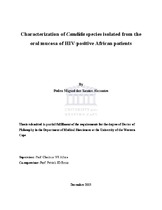| dc.description.abstract | One of the most common HIV-associated opportunistic infections is candidiasis, caused by Candida albicans or other Candida species. In immune suppressed subjects, this commensal organism can cause an increase in patient morbidity and mortality due to oropharyngeal or systemic dissemination. Limited information exists on the prevalence and antifungal
susceptibility of Candida species in the African continent, the most HIV-affected region globally and home to new and emerging drug resistant Candida species. The mechanisms of Candida drug resistance in the African continent have also not been described. In this study, 255 Candida species isolated from the oral mucosa of HIV-positive South African and Cameroonian patients were identified using differential and chromogenic media and their
drug susceptibility profiles tested using the disk diffusion method and the TREK Sensititre system, an automated broth microdilution method. Candida cell wall fractions were run on SDSPAGE and HPLC-MS with the aim of identifying peptides specifically expressed by antifungal drug resistant isolates.
Comparisons between the two groups of isolates revealed differences in Candida species prevalence and drug susceptibility with interesting associations observed between specific drug resistance and duration of ARV therapy. This study showed that fluconazole, the drug of choice for the treatment of candidiasis in the African continent, is not an effective therapy for most cases of Candida infection, and suggests that regional surveillance be implemented in the continent. A multiple-drug resistant Candida strain was identified in this study, a finding that has not previously been documented.
The use of proteomics tools allowed for the identification of peptides involved in drug resistance and the elucidation of Candida colonization mechanisms in HIV-infected African patients. | en_US |

